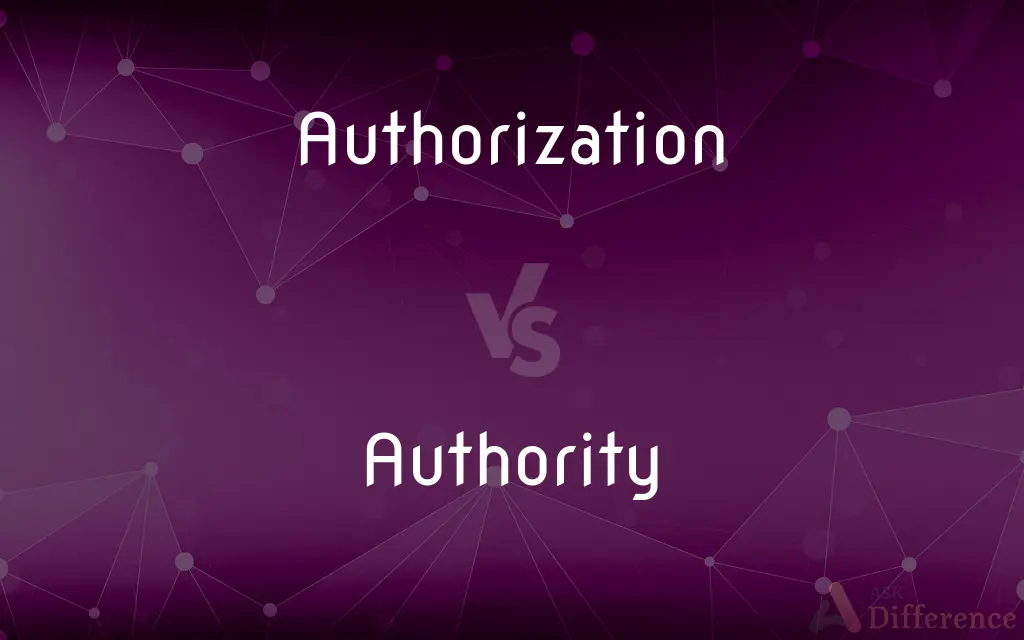Authorization vs. Authority — What's the Difference?
By Maham Liaqat & Urooj Arif — Updated on April 1, 2024
Authorization involves permission for actions, while authority refers to the power to make decisions.

Difference Between Authorization and Authority
Table of Contents
ADVERTISEMENT
Key Differences
Authorization is the process or act of giving someone permission to do something or to access certain resources. It is often formal and documented, involving specific permissions granted within a system or organization. Authority, on the other hand, refers to the right or power assigned to an individual or organization to make decisions, govern, or command.
Authorization is typically specific and situational, relating to particular actions, tasks, or access levels. For example, an employee may be authorized to access a confidential document or system. Authority is broader and more about the overall power and control an individual or organization holds, such as a manager's authority over their team or a government's authority over its citizens.
In many contexts, authority is the source from which authorization is derived. A person or entity with authority can grant authorization to others, thereby delegating specific permissions or rights. For instance, a company's executive (who has authority) can authorize an employee to negotiate contracts on behalf of the company.
Authorization is often temporary and can be revoked, depending on the rules set by the authority. It is typically granular, allowing for detailed control over what actions are permitted. Authority, however, is usually more stable and inherent to a position or role, reflecting a recognized power that isn't easily altered.
While authorization is crucial for operational security and compliance, ensuring that only permitted actions are taken, authority establishes the hierarchy and decision-making structure within organizations, governments, and other systems.
ADVERTISEMENT
Comparison Chart
Definition
Permission for specific actions or access
Power to make decisions and command
Source
Granted by those in authority
Inherent to a position or role
Scope
Specific and situational
Broad and general
Revocability
Can be revoked or altered
Generally stable, associated with a position
Purpose
Ensures operational security and compliance
Establishes hierarchy and decision-making power
Compare with Definitions
Authorization
Can be revoked.
Authorization to the software was revoked after the project's completion.
Authority
Right to govern or command.
Managers have the authority to assign tasks to their team members.
Authorization
Formal and documented.
Employees receive written authorization for travel expenses.
Authority
Source of authorization.
Authority figures grant authorization for various actions within an organization.
Authorization
Permission for actions or access.
Authorization is required for accessing the company's financial records.
Authority
Stable and recognized.
A teacher's authority in the classroom is recognized by both students and administration.
Authorization
Specific and situational.
Authorization for project budget adjustments is granted on a case-by-case basis.
Authority
Power to make decisions.
The board has the authority to approve new policies.
Authorization
Granted by authority.
Only the department head can authorize overtime work.
Authority
Inherent to position.
The CEO's authority includes making strategic decisions.
Authorization
Authorization is the function of specifying access rights/privileges to resources, which is related to general information security and computer security, and to access control in particular. More formally, "to authorize" is to define an access policy.
Authority
In the fields of sociology and political science, authority is the legitimate power that a person or a group of persons possess and practice over other people. In a civil state, authority is made formal by way of a judicial branch and an executive branch of government.In the exercise of governance, the terms authority and power are inaccurate synonyms.
Authorization
The act of authorizing.
Authority
The power to enforce laws, exact obedience, command, determine, or judge.
Authorization
Something that authorizes; a sanction.
Authority
One that is invested with this power, especially a government or body of government officials
Land titles issued by the civil authority.
Authorization
(uncountable) Permission.
I've got authorization. Call the office and you'll see.
Authority
Power assigned to another; authorization
Deputies were given authority to make arrests.
Authorization
(countable) An act of authorizing.
Authority
A public agency or corporation with administrative powers in a specified field
A city transit authority.
Authorization
(countable) (A document giving) formal sanction, permission or warrant.
Can I see your authorization?
Authority
An accepted source of expert information or advice
A noted authority on birds.
A reference book often cited as an authority.
Authorization
(government) Permission, possibly limited, to spend funds for a specific budgetary purpose.
We've had the authorization for years, but we've never gotten an appropriation.
Authority
A quotation or citation from such a source
Biblical authorities for a moral argument.
Authorization
The act of giving authority or legal power; establishment by authority; sanction or warrant.
The authorization of laws.
A special authorization from the chief.
Authority
Justification; grounds
On what authority do you make such a claim?.
Authorization
A document giving an official instruction or command
Authority
A conclusive statement or decision that may be taken as a guide or precedent.
Authorization
The power or right to give orders or make decisions;
He has the authority to issue warrants
Deputies are given authorization to make arrests
Authority
Power to influence or persuade resulting from knowledge or experience
Political observers who acquire authority with age.
Authorization
Official permission or approval;
Authority for the program was renewed several times
Authority
Confidence derived from experience or practice; firm self-assurance
Played the sonata with authority.
Authorization
The act of conferring legality or sanction or formal warrant
Authority
(uncountable) Power or right to make or enforce rules or give orders; or a position having such power or right.
I have the authority to penalise the staff in my department, but not the authority to sack them.
Vigilantes may have the power to nab criminals, but they lack the authority.
She lost all respect and authority after turning up drunk at the meeting.
Respect my authority!
Authority
(plural) Persons, regarded collectively, who occupy official positions of power; police or law enforcement.
Authorities say the suspect fled on foot.
Authority
(countable) A reliable, definitive source of information on a subject.
The world's foremost authority on orangutans
My cheap dictionary is not the authority on word derivations.
Authority
(uncountable) Status as a trustworthy source of information, reputation for mastery or expertise; or claim to such status or reputation.
Some thinkers regard appealing to authority as a logical fallacy; others regard it as a legitimate form of argument.
Authority
Official permission; authorisation to act in some capacity on behalf of a ruling entity.
Authority
(countable) A government-owned agency that runs a revenue-generating activity for public benefit.
New York Port Authority
Chicago Transit Authority
Authority
Legal or rightful power; a right to command or to act; power exercised buy a person in virtue of his office or trust; dominion; jurisdiction; authorization; as, the authority of a prince over subjects, and of parents over children; the authority of a court.
Thus can the demigod, Authority,Make us pay down for our offense.
By what authority doest thou these things ?
Authority
Government; the persons or the body exercising power or command; as, the local authorities of the States; the military authorities.
Authority
The power derived from opinion, respect, or esteem; influence of character, office, or station, or mental or moral superiority, and the like; claim to be believed or obeyed; as, an historian of no authority; a magistrate of great authority.
Authority
That which, or one who, is claimed or appealed to in support of opinions, actions, measures, etc.
Wilt thou be glass wherein it shall discernAuthority for sin, warrant for blame.
Authority
The power or right to give orders or make decisions;
He has the authority to issue warrants
Deputies are given authorization to make arrests
Authority
(usually plural) persons who exercise (administrative) control over others;
The authorities have issued a curfew
Authority
An expert whose views are taken as definitive;
He is an authority on corporate law
Authority
Freedom from doubt; belief in yourself and your abilities;
His assurance in his superiority did not make him popular
After that failure he lost his confidence
She spoke with authority
Authority
An administrative unit of government;
The Central Intelligence Agency
The Census Bureau
Office of Management and Budget
Tennessee Valley Authority
Authority
Official permission or approval;
Authority for the program was renewed several times
Authority
An authoritative written work;
This book is the final authority on the life of Milton
Common Curiosities
How is authorization granted?
Authorization is granted by someone in a position of authority, based on policies or rules.
Is authority always linked to a formal position?
Mostly, authority is linked to formal roles or positions, but it can also be derived from expertise, knowledge, or social consensus.
What happens if someone acts without authorization?
Acting without authorization can lead to disciplinary actions, security breaches, or legal consequences, depending on the context.
Why is authorization important in IT security?
In IT security, authorization helps prevent unauthorized access and protects sensitive information from breaches.
Can an organization operate without clear authorization and authority structures?
Lack of clear structures can lead to chaos, inefficiency, and security risks, underscoring the importance of both elements for proper governance.
What is the difference between authorization and authority?
Authorization is the permission to perform specific actions, while authority is the power to make decisions and govern.
Can authority be delegated?
Yes, authority can be delegated to others, but the delegator retains ultimate responsibility.
Can someone have authority without needing authorization?
Yes, individuals with authority can typically perform actions within their power without needing further authorization.
What is the role of authorization in governance?
Authorization plays a key role in governance by defining what actions are permissible within a system or organization.
Can authorization be specific to certain tasks?
Yes, authorization is often specific to particular tasks or access levels and can be limited in scope.
How is authorization revoked?
Authorization can be revoked by those in authority, often through a formal process or policy.
How do organizations ensure proper authorization?
Organizations use policies, access controls, and oversight mechanisms to ensure actions are properly authorized.
How does one gain authority?
Authority is usually gained through appointment to a specific position, recognition of expertise, or by virtue of law or policy.
Why is understanding the difference between authorization and authority important?
Understanding the difference is crucial for effective governance, security, and the smooth operation of systems and organizations.
Does authority change based on context?
The scope of an individual's authority can vary based on the context and the specific role they are performing.
Share Your Discovery

Previous Comparison
Everglade vs. Bayou
Next Comparison
Chiller vs. CoolerAuthor Spotlight
Written by
Maham LiaqatCo-written by
Urooj ArifUrooj is a skilled content writer at Ask Difference, known for her exceptional ability to simplify complex topics into engaging and informative content. With a passion for research and a flair for clear, concise writing, she consistently delivers articles that resonate with our diverse audience.















































